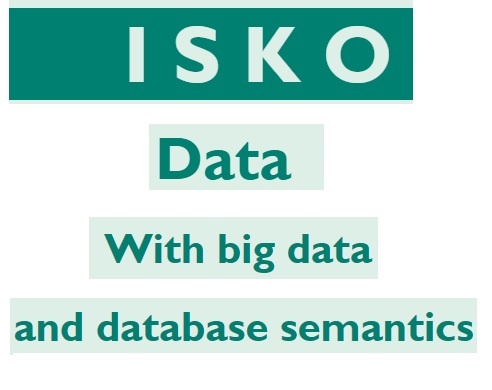Data, Big data and Database Semantics (entry in ISKO Encyclopedia, 2018)


You might be interested in taking a look at this new entry in ISKO Encyclopedia of Knowledge Organisation: Data: with big data and database semantics, by Birger Hjørland.
This paper seeks to define data and to relate this concept to other core concepts in → library and information science (LIS), including facts, information and documents. Data is a much-used concept in many fields, including LIS, in particular in composite terms such as database, data archive, data mining, descriptive data, metadata, linked data and now big data. These terms are common terms of the field and need proper theoretical and terminological attention... |
Abstract:
It is argued that data should be defined as information on properties of units of analysis. Epistemologically it is important to establish that what is considered data by somebody need not be data for somebody else. This article considers the nature of data and big data and the relation among data, information, knowledge and documents. It is common for all these concepts that they are about phenomena produced in specific contexts for specific purposes and may be represented in documents, including as representations in databases. One important aspect about big data is that they are often unintentional traces we leave during all kinds of activities. Their potential to inform somebody about something is therefore less direct as compared to data that have been produced intentionally as, for example, scientific databases.
Table of contents:
1. Introduction
2. Defining data:
2.1 Epistemological issues;
2.2 Data, facts, information and documents;
2.3 Data and documents confused;
2.4 Recorded data;
2.5 Further definitions and conclusion3. Big data:
3.1 Etymology;
3.2 Defining big data;
3.3 Big data in different contexts
4. Big data and undiscovered public knowledge5. Towards a social epistemological understanding of data:
5.1 The myth of empiricism;
5.2 Standards;
5.3 Database semantics
6. Conclusion
Acknowledgments
Endnotes
References
Colophon
Data & Semantics : learn more :
- Interest Group in Agricultural Data (IGAD) RDA Pre-Meeting P12, 5-6 November, 2018, in Gaborone, Botswana, Africa
- Register for free e-course Open Data Management in Agriculture and Nutrition
- OPEN DATA : Looking Back, Looking Ahead
- Using Open Data
- Priorities for the next few years for the AGROVOC multilingual thesaurus published as Linked Open Data
- What does Data Interoperability Require in Practice?
- Semantic Interoperability
- The role of AGROVOC and other Linked Data vocabularies in architectural models of interoperability
- LODE-BD REcommendations 2.0: How to select appropriate encoding strategies for producing Linked Open Data (LOD)-enabled bibliographic data
- CGIAR Platform for Big Data in Agriculture
- How Big Data Can Improve Data Visualizations and Responsiveness
- METADATA 2020 : details and crosswalks of the recommendations. Can we agree?
- Meaningful Bibliographic Metadata (M2B): Recommendations of a set of metadata properties and encoding vocabularies
- Big Metadata : prioritizing next steps to advance Metadata Research in Data Science
- Open & Big Data : shifts in roles, power relations, quality and knowledge integration
- Ontology-based Navigation of Bibliographic Metadata: Example from the Food, Nutrition and Agriculture Journal
- Building an Integrated Formal Ontology for Semantic Interoperability in the Fishery Domain
- SPAR Ontologies to enhance the scholarly articles with annotations about its structural and semantic characterisations
- License your Research Data with help of FACT SHEET on CREATIVE COMMONS & OPEN SCIENCE
- Building a Culture of Data Citation ... with Persistent Identifiers
- Incorporating FAIR Data Principles in Agricultural Research Management Information System (ARMIS) database in Bangladesh
To keep up-to-date with AIMS news, please, Sign up for AIMS News, follow @AIMS_Community on Twitter.
And, thanks again for your interest !

.jpg)
